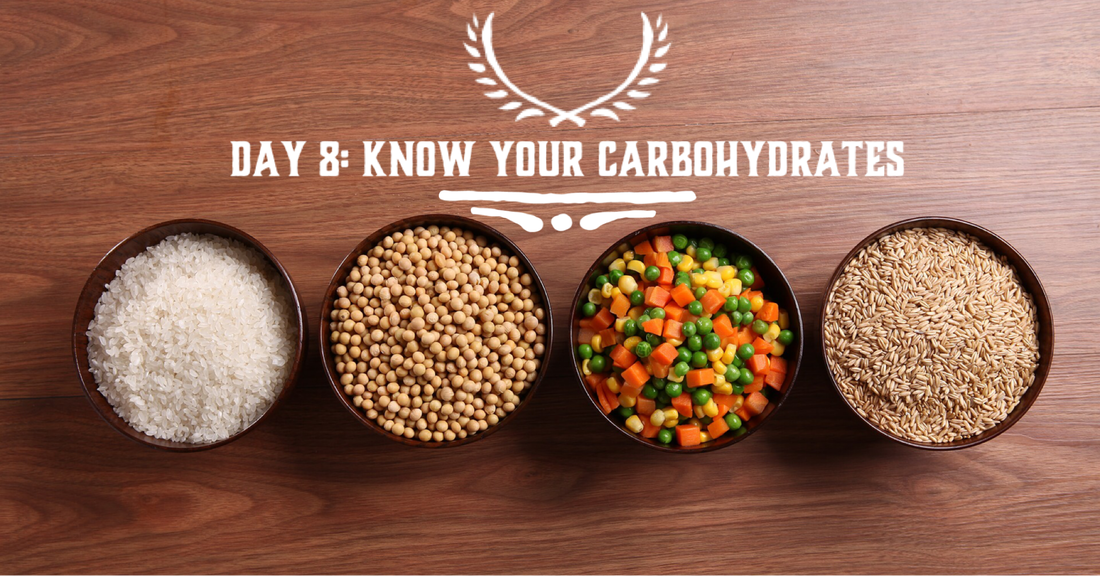Day 8: Know Your Carbohydrates
Let’s get to the basics of carbohydrates (CHO). It is the primary source of energy for the body. Carbohydrate is found in most foods we eat.
What kind of carb will make you gain weight and help in losing weight?
Carbs can either be refined or unrefined. Highly processed food like white rice and white flour are refined carbs. Most of the good fiber has been removed. You end up with starch, which although a complex form of carb, lacks the bulk that makes you feel full. You end up eating more portions for satiety. Ever wonder why you can eat a bowl of white rice or can finish a loaf of white bread? It’s so refined that you can stuff a lot of calories in your gut and still feel hungry. Excess sugar leads to fat conversion and weight gain.
This is why the Mediterranean diet gives you one point for eating 1.5 cups or less of whole grains (brown rice instead of white) and another point for eating 2-3 cups of vegetables.
If you eat 1.5 cups of fruits like oranges, apples, berries for snacks, that will be another point. It’s so easy to score points just by making the right carb choices. Instead of cookies, candies, doughnuts, pastries, and such, pick these foods first and score points. Be mindful of the serving size.
It’s hard to adhere to a low-carb diet when you can’t even stick to a regular carb diet. We are so used to a high-carb diet with half of our plate occupying it. The myplate.gov only allots 1/4 space for whole grains, roughly 1/2 a cup of brown rice each meal.
Carbohydrates can either be simple or complex.
Your body quickly absorbs simple carbs like sugar, honey, or maple syrup. This leads to a quick rise in blood glucose.
Here are the different types of simple carbs:
1) Monosaccharides are single sugars:
a) fructose (sugar in fruits)
b) glucose
c) galactose
2) Disaccharides have two sugar components:
a) Sucrose (table sugar) = glucose + fructose.
b) Maltose (malt sugar) = glucose + glucose
c) Lactose (milk sugar) = glucose + galactose
Because it is readily available, an excess supply will lead the body to convert it to fat for storage. So drinking fruit juices, soda, sweet coffee regularly can easily make you gain weight. They’re calorie-rich but nutrient-poor.
Complex carbs are long-chain sugars or polysaccharides that are absorbed more slowly by the body because they need to be broken down into simple carbs for energy use. These are the starches and fibers. Sugars are also stored in the muscle and liver in the form of polysaccharides called glycogen for energy use. Cellulose is a polysaccharide that is hard to digest. These are from plants and increases the fiber content of your diet. This is a good form of sugar because it helps move your bowel and doesn’t contribute to weight gain but instead helps maintain weight and blood sugar spikes. More on these in the next few days.
For now, let's look at our Mediterranean Diet Checklist and make sure we check off the carbohydrates that can score us health points. Do the carb challenge below.
What kind of carb will make you gain weight and help in losing weight?
Carbs can either be refined or unrefined. Highly processed food like white rice and white flour are refined carbs. Most of the good fiber has been removed. You end up with starch, which although a complex form of carb, lacks the bulk that makes you feel full. You end up eating more portions for satiety. Ever wonder why you can eat a bowl of white rice or can finish a loaf of white bread? It’s so refined that you can stuff a lot of calories in your gut and still feel hungry. Excess sugar leads to fat conversion and weight gain.
This is why the Mediterranean diet gives you one point for eating 1.5 cups or less of whole grains (brown rice instead of white) and another point for eating 2-3 cups of vegetables.
If you eat 1.5 cups of fruits like oranges, apples, berries for snacks, that will be another point. It’s so easy to score points just by making the right carb choices. Instead of cookies, candies, doughnuts, pastries, and such, pick these foods first and score points. Be mindful of the serving size.
It’s hard to adhere to a low-carb diet when you can’t even stick to a regular carb diet. We are so used to a high-carb diet with half of our plate occupying it. The myplate.gov only allots 1/4 space for whole grains, roughly 1/2 a cup of brown rice each meal.
Carbohydrates can either be simple or complex.
Your body quickly absorbs simple carbs like sugar, honey, or maple syrup. This leads to a quick rise in blood glucose.
Here are the different types of simple carbs:
1) Monosaccharides are single sugars:
a) fructose (sugar in fruits)
b) glucose
c) galactose
2) Disaccharides have two sugar components:
a) Sucrose (table sugar) = glucose + fructose.
b) Maltose (malt sugar) = glucose + glucose
c) Lactose (milk sugar) = glucose + galactose
Because it is readily available, an excess supply will lead the body to convert it to fat for storage. So drinking fruit juices, soda, sweet coffee regularly can easily make you gain weight. They’re calorie-rich but nutrient-poor.
Complex carbs are long-chain sugars or polysaccharides that are absorbed more slowly by the body because they need to be broken down into simple carbs for energy use. These are the starches and fibers. Sugars are also stored in the muscle and liver in the form of polysaccharides called glycogen for energy use. Cellulose is a polysaccharide that is hard to digest. These are from plants and increases the fiber content of your diet. This is a good form of sugar because it helps move your bowel and doesn’t contribute to weight gain but instead helps maintain weight and blood sugar spikes. More on these in the next few days.
For now, let's look at our Mediterranean Diet Checklist and make sure we check off the carbohydrates that can score us health points. Do the carb challenge below.

